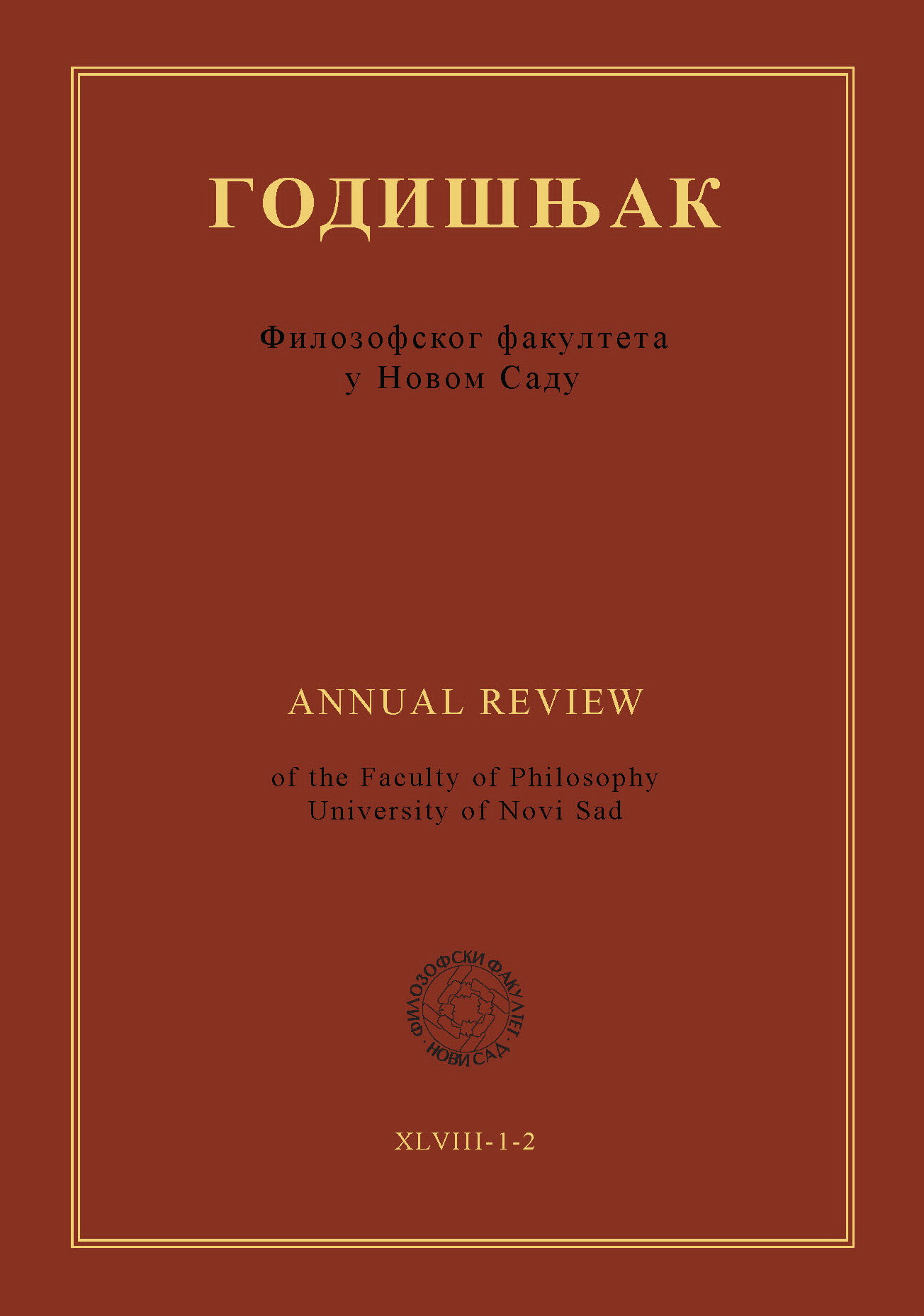GREGORIUS AS A TRANSLATOR AND AN INTERPRETER OF LIFE
Main Article Content
Abstract
Gregorius, as translator of The Goldsmith of Words and detective "interrogating the survivors," assumes the role of translating a vast complex of philosophical questions as well as dramatic historical events and their impact on the fate of the individual and the collective. In his second novel, Mercier, by the means of his character of the intellectual translator, treats the process of translation as a process of mediating knowledge; his hero/antihero Gregorius is not a translator in the strict sense of the word; translation is modelled in the text as a means of learning a foreign language and, consequently, as a linguistic ability that allows the mediation of knowledge from a foreign language. However, he is deeply rooted in the text and the language, therefore the typology of the figure of the translator as developed by Klaus Kaindl (2010) can be applied to Gregorius when he distinguishes between physical, psychological and cognitive dimensions. Gregorius fulfils the image of physical deficiencies (eyesight), weaknesses or illnesses (Gregorius loses consciousness and, at the end of the novel, goes to the hospital for a thorough examination, which he expects to rule out the presence of a tumour). He also fulfils Kaindl's characteristics of the psychological dimension, as he displays hesitation, anxiety, fear of new contacts and of the new in general, etc. It is only in the cognitive dimension that he is one of those representatives who does not show burnout in the form of mechanical work - or perhaps we trace a certain mechanisation in his practice as a teacher (everything happens the same way every day), but it is the translation of the new book that brings him out of this stagnation and leads him to the Lisbon adventure. This is also why, as we stated, we understand the function of translation in the novel in relation to classical languages as both escape and knowledge, but as far as Portuguese is concerned, we consider the translation from it as a cathartic element through which Gregorius narrates what he could not narrate himself. At the same time, it can be said that Pascal Mercier creates a different type of translator than most contemporary prose with this type of character, especially migrant prose.
The author also makes purposeful use of the genre of the psychological and philosophical novel, and through hypertextuality and the novel within the novel, he creates a wide space for his reflections, especially on the philosophy of language, freedom of will and the you/interpretation of identity. The protagonist is a translator in relation to Prado's book The Goldsmith of Words, and an interpreter of Prado's thoughts in relation to his story, while an intradiegetic autodiegetic narrator (Prado) is involved in The Goldsmith of Words, the plot of The Night Train to Lisbon is narrated by an extradiegetic heterodiegetic narrator, but at the same time Gregorius as a character in relation to the fictional hypothetical The Goldsmith of Words becomes an intradiegetic heterodiegetic narrator, but technically realized through semi-direct speech. While in the translator position Mercier strives to express his desire for perfection in translation, for an accurate and faithful transfer of meaning from one language to another, just as Gregorius does not only with Portuguese but also with the classical languages, in the interpreter position he moves away from the common perception of interpreting as a reproduction of content and becomes an interpreter of interpretation, as he seeks to imbue the translated content with meaning or confronts it with his own knowledge. As if translation and reinterpretation were not enough, Mercier uses the protagonist to explore what these two acts of working with language can do to a person and how they imprint themselves in self-knowledge.
Downloads
Article Details

This work is licensed under a Creative Commons Attribution-ShareAlike 4.0 International License.
References
Andres, D. (2008). Dolmetscher als literarische Figuren: Von Identitätsverlust, Dilettantismus und Verrat. Mníchov: Peter Lang.
Bhabha, K. H. (2000). Die Verortung der Kultur. Tübingen: Stauffenburg.
Böhmer, A. O. (25. 11. 2004). Geheimnisse der Nacht. Die Zeit 49.
Čermák, I. (2004). Narativní myšlení a skutečnost. Československá psychologie, XLVIII(1), 17–26.
de Medeiros, P. (2016). Another country, another time : notes on Pascal Mercier’s Nachtzug nach Lissabon and an idea of Europe. Cadernos de Literatura Comparada, 34(6), 245–263. DOI: https://doi.org/10.21747/16451112/litcomp34a16
Die Kartografie des Denkens. Rozhovor s Petrom Bierim, 8. apríla 2017. Available at https://oe1.orf.at/artikel/204695/Die-Kartografie-des-Denkens (2023, February 12)
Ein Roman als Philosophie. Rozhovor s Pascalom Mercierom. Available at https://www.deutschlandfunk.de/ein-roman-als-philosophie-100.html (2023, March 15)
Huneven, M. (13. 1. 2008). Spiritual swerve. Los Angeles Times. Available at https://www.latimes.com/archives/la-xpm-2008-jan-13-bk-huneven13-story.html (2023, May 4)
Kaindl, K. (2010). Ausgelaugt, krank und beziehungsgestört: Die Identitätskonstruktion von TranslatorInnen in literarischen Werken. U: Yamamoto, H. – Ivanovic, Ch. (ured.) (2010). Übersetzung – Transformation. Würtzburg: Königshausen und Neumann. 63–75.
Krumbholz, M (9. 2. 2005). Rezensionsnotiz. Neue Zürcher Zeitung.
Lučanský, A. (29. 10. 2020). Jeden z najkvalitnejších románov, ktorý som čítal za posledné roky (nad knihou Nočný vlak do Lisabonu). Available at https://dennikn.sk/blog/2113783/jeden-z-najkvalitnejsich-romanov-ktore-som-cital-za-posledne-roky-nad-knihou-nocny-vlak-do-lisabonu/ (2023, March 19)
Müller, B. (17. 11. 2004). Rezensionsnotiz. Süddeutsche Zeitung.
Nickel, G. (28. 8. 2004). Es könnte auch anders sein. Die Welt. Available at https://www.welt.de/print-welt/article336806/Es-koennte-auch-anders-sein.html (2023, May 6)
Olshan, J. (6. 1. 2008). Man's awakening prompts journey to learn about late author in 'Night Train to Lisbon. SFGATE. Available at https://www.sfgate.com/books/article/Man-s-awakening-prompts-journey-to-learn-about-3233147.php (2023, January 24)
Ricoeur, P. (2007). Čas a vyprávění III. Praha: Oikoymenh.
Šedíková Čuhová, P. (2022). Útek do prekladu. U: Bariaková, Z. – Šedíková Čuhová, P. (ured.) (2022). Neviditeľné postavy. 139–162.
Voigt, C. (28. 9. 2004). Eine Reise ins Denken. Spiegel. Available at https://www.spiegel.de/spiegelspecial/a-320401.html (2022, November 8)
Yardley, J. (20. 1. 2008). NIGHT TRAIN TO LISBON. Washington Post, Sunday. Available at https://www.washingtonpost.com/wp-dyn/content/article/2008/01/17/AR2008011702794.html (2023, February 21)




